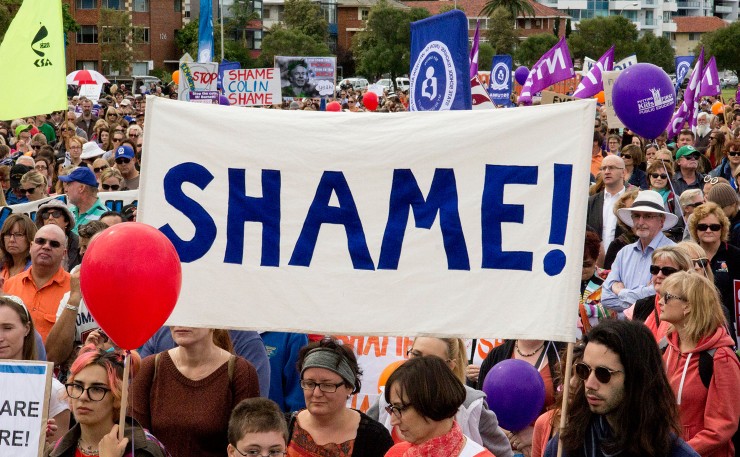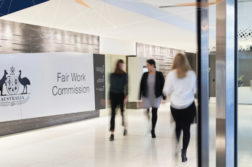It may have seemed like business as usual, more or less, at Australian airports today, but the government’s wage freeze on Border Force workers is likely to spark more industrial action. Thom Mitchell reports.
A 24-hour strike of Australian Border Force workers appears to have caused few delays today across Australia’s network of airports, but the stand off looks set to continue with neither the Community and Public Sector Union nor the Federal Employment Minister Michaelia Cash prepared to give ground.
The strike is the latest in a series of escalating industrial actions that have wracked the public sector following the Abbott and Turnbull government’s failure to negotiate new enterprise bargaining agreements after they lapsed across the public service at the end of June last year.
Community and Public Sector Union National Secretary Nadine Flood said there are “thousands of Border Force officials who face losing up to $8,000 a year from their current pay, and there is a smaller group of highly specialised officers and officers working in remote locations who face, in some cases, losses of up to 20,000 a year”.
“Obviously for all of these workers this is a big chunk of their pay packet, and they are angry and frustrated that after more than a year this threat is still hanging over their heads,” she said.
Why we are on strike today. #borderforce #cpsusafeguard #ausunions pic.twitter.com/eLbCzLpAxS
— CPSU (@CPSUnion) November 8, 2015
The government has hit out at the union for inconveniencing the public, insisting it is negotiating in good faith, and ABF Assistant Commissioner Clive Murray said last week the agency “will work to provide the best service we can, allocating available resources where they are needed”.
According to the CPSU, the government has focused on managing passenger queues at major airports like Sydney and Melbourne, using managers to cover staff shortages, and rostering on trainees.
“Our agriculture members inside arrivals also report that Border Force management are waving people through without stopping the passengers they would normally stop for additional immigration and border force checks,” Flood said.
In a statement to New Matilda the Employment Minister Michaelia Cash hit back at the union, suggesting that “travellers are unlikely to be sympathetic to the CPSU’s approach of striking instead of talking”.
“The government is disappointed that the CPSU has chosen go on strike and disadvantage travellers rather than sitting down and negotiating a new agreement using the flexibility provided by the government’s revised bargaining policy,” Cash said.
It’s the sort of response, according to Flood, that has angered public sector workers across the board.
“We’ve got over 96 per cent of public servants who still don’t have a new enterprise agreement in place — 18 months after they expired — so community and public sector workers have already copped an effective 18 month wage freeze,” the union leader said.
“The comment of Minister Cash that has really got public sector workers, particularly ABF workers, furious is that they are not living in the real world,” she said. “In the real world people need to maintain their current pay packet so they can pay their bills.
“We have acknowledged that the government has agreed to speak to us for the first time in over 18 months and I have met with Minister Cash. That is a positive sign, but unfortunately the revised policy the government put out last week maintains the attack on rights and conditions for all workers and doesn’t fix the pay cuts in Border Force.”
Massive Travellers queue for international dep doors due to #borderforce #strike action pic.twitter.com/4WCrzeXrAS — Penny Stephens (@byPennyStephens) November 8, 2015
In late September, 91 per cent of workers employed within the broader Department of Immigration and Border Protection — more than 10,000 employees, and not all of them unionised — voted to reject the enterprise bargaining agreement on offer.
Flood said she had spoken to businesspeople “gobsmacked” by that “staggering” result, and that “there isn’t a single major employer in the country settling enterprise agreements for what this government has on offer”.
“Minister Cash’s statements were very disappointing given that the CPSU changed our focus in March this year to say maintaining real wages and current rights and conditions were the big issues for workers,” she said.
“Now, we have followed that up with detailed surveys of delegates and members, and proposed a set of outcomes which is to maintain rights and conditions, maintain people’s current pay, not an unreasonable requests, with a payoff of somewhere between 2.5 and 3 per cent.”
The Employment Minister sets the terms that individual departments within the public service can bargain within, and Cash recently increased the ceiling for pay rises that can be offered from 1.5 to 2 per cent.
According to Flood, the government is going to have to compromise further or industrial action will likely continue.
“In over 20 years of enterprise bargaining we have never seen a situation where 96 per cent of the public service has been unable to resolve an agreement after 18 months,” she said.
The Chief Executive Officer of the Australian Airports Association, Caroline Wilkie said she hopes an agreement is reached soon.
“While the industrial action being taken by the CPSU and the Department’s employer response may be allowed under the Fair Work Act, it is clearly not in the interests of the travelling public, airlines or airport operators who have to deal with the consequences of disruption to passenger and freight process,” Wilkie said.
The current bout of industrial action by Australian Border Force workers will cease at midnight tonight.
Donate To New Matilda
New Matilda is a small, independent media outlet. We survive through reader contributions, and never losing a lawsuit. If you got something from this article, giving something back helps us to continue speaking truth to power. Every little bit counts.





